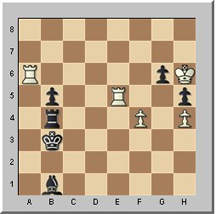
-Mark Dvoretsky, Russian chess trainer from the Botvinnik School of Chess.
Long ago, long before Steintz in the 1800s, it was felt that a chessplayer won or lost a game solely by virtue of his ingenuity. Paul Morphy was a child prodigy, an American genius, so he beat everyone; his opponents were less talented, and therefore they lost to him. Such was the thinking before Steintz emerged and changed everything. He started out as a player in the romantic tradition, going all out for sacrifice and combination. Then he developed a series of concepts that made him all but unbeatable during the twenty-eight years that he was the champion.
Today we can learn many things from Steintz’s mode of play. He followed certain basic principles in the openings, middlegames and endings, which were based on an accumulation of small advantages. Steintz has written that a player should forget those wild attacks.
Prepare a position and follow it through using the logic of the position itself and not the chimera of a superficial attack. Wait, prepare, and then attack when the opponent’s position is shaky. Timing is very important.
Steintz worked out the concept of strong and weak squares.
His opponents may have had more dash and flair. It made no difference. Steintz beat them all because of the profundity of his ideas. And most important of all – and the juniors can learn a great chess lesson here – Steintz always played the board, never the man; he was always searching for the objective right move.
Our senior players have begun to confront the country’s highest rated players with some amount of confidence. Wendell Meusa played unbeaten in the National Champion-ships in November/December, but already this year he has lost to Taffin Khan and Michael Perreira. Loris Nathoo was in a clearly winning position against him but blundered horribly in the endgame to give Meusa the win.
The juniors are also developing their game, and it would be interesting to see how Cecil Cox would fare as national champion in this Topco Juices Mashramani Tournament which concludes today.
Dvoretsky is the most highly respected chess trainer in Russia, and therefore enjoys the distinction of being regarded as the world’s best chess trainer. He emphasises the importance of analysing our own games to discover our strengths and weaknesses. He emphasises the importance of studying the classics so that we can appreciate the ‘thinking’ of the old masters. He emphasises the importance of planning. And I believe if Dvoretsky tells us these things, we should listen.
Le v Nepomniachtchi
A young Vietnamese grandmaster, Le Quang Liem, 19, is creating waves in the chess world with spectacular performances in some very strong international tournaments. Recently, Le finished joint first in the notoriously tough Moscow Open, with a 7.0/9 performance. Immediately after that victory, without a rest, he entered for the strong Aeroflot Open which boasted a field of 73 grandmasters from among the eighty participants. With the following victory against Russia’s Ian Nepomniachtchi in the final round, he clinched sole first in the Aeroflot open. Le is now poised to become the first Vietnamese to top the 2700 mark on the FIDE rating scale.
Le Quang Liem (2647) – Nepomniachtchi, I (2658)
9th Aeroflot Open A Moscow RUS (9), 17.02.2010

50.Rxg6 Bxg6 51.Kxg6 Rxf4 52.Rxb5+ Kc4 53.Rxh5 and this rook ending wins for White: 53…Rg4+ 54.Kf5 Rg8 55.Rg5 Rh8 56.h5 Kd5 57.Kg6+ Ke6 58.Kg7 Re8 59.h6 Re7+ 60.Kg6 Black Resigns! 1-0.





